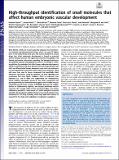High-throughput identification of small molecules that affect human embryonic vascular development
Author(s)
Vazão, Helena; Rosa, Susana; Barata, Tânia; Costa, Ricardo; Pitrez, Patrícia R.; Honório, Inês; de Vries, Margreet R.; Papatsenko, Dimitri; Benedito, Rui; Saris, Daniel; Quax, Paul H. A.; Pereira, Carlos F.; Mercader, Nadia; Fernandes, Hugo; Ferreira, Lino; Khademhosseini, Alireza; ... Show more Show less
DownloadVazao-2017-High-throughput identification of s.pdf (2.174Mb)
PUBLISHER_POLICY
Publisher Policy
Article is made available in accordance with the publisher's policy and may be subject to US copyright law. Please refer to the publisher's site for terms of use.
Terms of use
Metadata
Show full item recordAbstract
Birth defects, which are in part caused by exposure to environmental chemicals and pharmaceutical drugs, affect 1 in every 33 babies born in the United States each year. The current standard to screen drugs that affect embryonic development is based on prenatal animal testing; however, this approach yields low-throughput and limited mechanistic information regarding the biological pathways and potential adverse consequences in humans. To develop a screening platform for molecules that affect human embryonic development based on endothelial cells (ECs) derived from human pluripotent stem cells, we differentiated human pluripotent stem cells into embryonic ECs and induced their maturation under arterial flow conditions. These cells were then used to screen compounds that specifically affect embryonic vasculature. Using this platform, we have identified two compounds that have higher inhibitory effect in embryonic than postnatal ECs. One of them was fluphenazine (an antipsychotic), which inhibits calmodulin kinase II. The other compound was pyrrolopyrimidine (an antiinflammatory agent), which inhibits vascular endothelial growth factor receptor 2 (VEGFR2), decreases EC viability, induces an inflammatory response, and disrupts preformed vascular networks. The vascular effect of the pyrrolopyrimidine was further validated in prenatal vs. adult mouse ECs and in embryonic and adult zebrafish. We developed a platform based on human pluripotent stem cell-derived ECs for drug screening, which may open new avenues of research for the study and modulation of embryonic vasculature.
Date issued
2017-04Department
Harvard University--MIT Division of Health Sciences and TechnologyJournal
Proceedings of the National Academy of Sciences
Publisher
National Academy of Sciences (U.S.)
Citation
Vazão, Helena et al. “High-Throughput Identification of Small Molecules That Affect Human Embryonic Vascular Development.” Proceedings of the National Academy of Sciences 114, 15 (March 2017): E3022–E3031 © 2017 National Academy of Sciences
Version: Final published version
ISSN
0027-8424
1091-6490